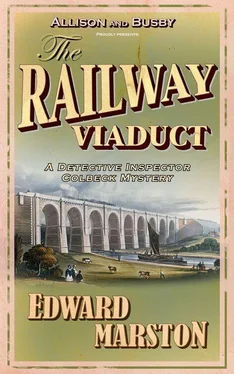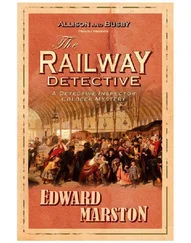Edward Marston - The railway viaduct
Здесь есть возможность читать онлайн «Edward Marston - The railway viaduct» весь текст электронной книги совершенно бесплатно (целиком полную версию без сокращений). В некоторых случаях можно слушать аудио, скачать через торрент в формате fb2 и присутствует краткое содержание. Жанр: Классический детектив, на английском языке. Описание произведения, (предисловие) а так же отзывы посетителей доступны на портале библиотеки ЛибКат.
- Название:The railway viaduct
- Автор:
- Жанр:
- Год:неизвестен
- ISBN:нет данных
- Рейтинг книги:3 / 5. Голосов: 1
-
Избранное:Добавить в избранное
- Отзывы:
-
Ваша оценка:
- 60
- 1
- 2
- 3
- 4
- 5
The railway viaduct: краткое содержание, описание и аннотация
Предлагаем к чтению аннотацию, описание, краткое содержание или предисловие (зависит от того, что написал сам автор книги «The railway viaduct»). Если вы не нашли необходимую информацию о книге — напишите в комментариях, мы постараемся отыскать её.
The railway viaduct — читать онлайн бесплатно полную книгу (весь текст) целиком
Ниже представлен текст книги, разбитый по страницам. Система сохранения места последней прочитанной страницы, позволяет с удобством читать онлайн бесплатно книгу «The railway viaduct», без необходимости каждый раз заново искать на чём Вы остановились. Поставьте закладку, и сможете в любой момент перейти на страницу, на которой закончили чтение.
Интервал:
Закладка:
Hers were not the only billets-doux he found in the room. A Frenchwoman, signing herself with the letter 'D', wrote with even greater passion from somewhere in Paris. She was more circumspect. No address was given in her letters, only the city from where the mail was dispatched. Colbeck checked the rest of the correspondence. Business letters showed that Chabal had built himself a reputation that brought in several offers of work. One person, from England, invited him to return there in order to give some more lectures on his work as a civil engineer. The fee was tempting.
Even when working on a railway, Chabal kept an extensive wardrobe and Colbeck found a jacket identical to the one that had taken an unfortunate dip in the Sankey Canal. There were many other clues to the character of the deceased and they helped to give the inspector a full portrait of him. When he went downstairs, he found the landlady in tears, stunned by the loss of her charming lodger and horrified at the manner of his death. Colbeck told her that, once Chabal's family and friends were informed of his demise, someone would soon come to claim his effects.
Paris was his next destination. Boarding a train at the station, Colbeck went on the short journey from Mantes, intrigued to see what had been for so many years the capital of Europe. It was a city that celebrated the arts, and composers, musicians, dancers, artists, poets and authors from many countries had flocked there in search of inspiration. Chopin, Liszt, Mendelssohn, Donizetti, Rossini, Verdi, Wagner and Heine had all resided there at one time or another. Two English authors whose novels were on Colbeck's bookshelves back home in London – Dickens and Thackeray – had also lived in the city. It was a place of cosmopolitan talent with superb art galleries, concert halls and opera houses to display it.
Colbeck was not disappointed. Driven in a cab along its broad boulevards, he marvelled at its sumptuous architecture and tried to take in its full wonder. The buildings of Paris reflected an empire that no longer existed but that could still stir the imagination. What he noticed was the abundance of outdoor cafes, where customers were enjoying a leisurely drink in the sunshine while reading a newspaper, playing dominoes or talking with friends. Like any major city, Paris had its share of slums and Colbeck saw something of them when he was taken through a maze of back streets. The grinding poverty in the mean tenements was exacerbated by the prevailing stink of the drains.
Before he reported the death of Gaston Chabal to the police, and left them to track down his family, Colbeck wanted to visit the address that Thomas Brassey had given him for the late engineer. The detective hoped to find out a little more about the man on his own account. Once the French police were involved, he would have to surrender the initiative to them. The address was in the Marais, one of the oldest and most interesting parts of the city, and it took its name from the marshes on which it was built. When the cab pulled up in a busy street, he saw that the dead man had owned a tall, narrow house with a hint of Gothic extravagance in its facade. It was large enough to require servants, so Colbeck could expect someone to be at home.
He alighted from the cab and was immediately reminded how much taller he was than the average Frenchman. Most of those who bustled past him were distinctly shorter and had darker complexions. From the hostile glances he was given, Colbeck could see that the passers-by had guessed his nationality. He pulled the bell rope and heard it ring deep inside the house. The door was soon opened by a pretty young woman with a look of hope and expectation in her eyes. When she saw that a stranger had called, she let out a sigh.
Colbeck thought that she could be no more than sixteen or seventeen. It was clear from her manner and her elegance that she was no servant. Since he had been informed that Chabal was unmarried, he assumed that she might be a relative of his. Breaking the sad news to her would be painful but it had to be done. Lifting his hat in a gesture of courtesy, Colbeck gave a smile.
'Bonjour, Mademoiselle,' he said.
'Madame,' she corrected.
'Ah.' He looked down and saw her wedding ring.
'Vous etes un ami de Gaston?' she asked.
It was an awkward question and Colbeck did not wish to answer it on a doorstep when people were walking past all the time. Since he had bad tidings to impart, he needed to do so in privacy. He reached for a polite euphemism.
'J'ai fait sa connaissance.'
'C'est mon marie.'
Colbeck was shaken. He was talking to Gaston Chabal's wife.
Victor Leeming had been startled when first given the assignment, but he had adapted to the notion very quickly. He was very pleased to be directly involved in the business of detection again. Strong enough to do the work, he also had the facial characteristics to pass as a navvy. For once, his ugliness was a positive advantage. Wearing moleskin trousers, double-canvas shirt, velveteen square-tailed coat, hobnail boots and a mud-spattered felt hat with the brim turned up, he looked almost indistinguishable from the rest of the men. Like them, he even wore a gaudy handkerchief at his neck to add some colour.
Railway work covered a wide variety of skills, each trade commanding a different wage. Leeming met carpenters, blacksmiths, miners, quarrymen, masons, bricklayers, horse keepers and sawyers. Taken on as a navvy, he was responsible to a ganger, a huge man with the rasping tongue and bulging muscularity needed to keep such an unruly group of workers in order. Digging, loading, cutting and tipping were the navvies' traditional tasks. Unskilled work was left to the labourers. Leeming was a cut above them.
When they were building a railway in England, navvies had an allowance of two pounds of beef and a gallon of beer a day. Since they had been in France, however, they had discovered that brandy was cheaper than beer and more potent. It had become the drink of choice for many of them. The fact that they spent their money so freely in the local inns made them more acceptable to the indigenous population. Given a shovel, Leeming was ordered to load spoil into wagons. It was hard, tiring, repetitive work but he did it without complaint. Those alongside him were largely Irish and they tended to work in silence. A group of Welsh navvies further down the line, however, insisted on singing hymns as they used pick and shovel on the rocky ground.
'Will you listen to those bastards?' said Liam Kilfoyle, during a brief rest. 'They never stop.'
'I'm surprised they've got the breath to sing,' observed Leeming.
'They'll work all day, fuck all night and sing their heads off while they're doing both. It's unnatural, that's what it is.'
'They sound happy enough.'
'Little things please little bloody minds.'
Kilfoyle was a tall, stringy individual in his twenties with a pair of small, darting eyes in a face that reminded Leeming of a weasel. The sergeant had gone out of his way to befriend the young Irishman, feeding him the story that Brassey had prepared for his new recruit. The problem was that Leeming could only understand half of what Kilfoyle said because the latter kept using colloquialisms that were peculiar to the Irish. He knew the rhyming slang of the London underworld by heart but this was quite different. When in doubt as to his companion's meaning, he simply nodded. Kilfoyle seemed amiable enough. Putting his shovel aside, he undid his trousers and urinated against the wheel of a wagon, breaking wind loudly in the process. He did up his moleskin trousers again.
'Have you worked for Mr Brassey before?' said Kilfoyle.
'No – what's he like?'
'He's a fair man and you'll not find too many of them in this line of business. Some contractors are bloody tyrants, so they are. Real bloodsuckers. Not our Mr Brassey. His only fault is that he won't allow beer to be sold on site. Shovelling earth is thirsty work.'
Читать дальшеИнтервал:
Закладка:
Похожие книги на «The railway viaduct»
Представляем Вашему вниманию похожие книги на «The railway viaduct» списком для выбора. Мы отобрали схожую по названию и смыслу литературу в надежде предоставить читателям больше вариантов отыскать новые, интересные, ещё непрочитанные произведения.
Обсуждение, отзывы о книге «The railway viaduct» и просто собственные мнения читателей. Оставьте ваши комментарии, напишите, что Вы думаете о произведении, его смысле или главных героях. Укажите что конкретно понравилось, а что нет, и почему Вы так считаете.












